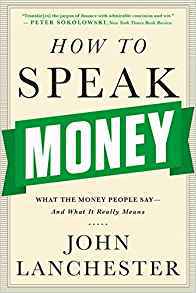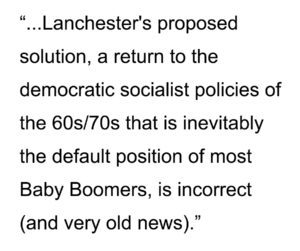 REVIEW
REVIEW
How to Speak Money: What the money people say… and what they really mean
by John Lanchester
John Lanchester’s How to Speak Money: What the money people say… and what they really mean is a worthwhile read though the whole adds up to somewhat of a mixed bag. The first chapter, “The Language of Money” is a fabulous, broad-based read, mostly focused on telling the story of economics as a field and topic of study. The middle definition section, “The Lexicon of Money” is mostly thorough and informative but a lot of readers (for example, architects, urban designers, urban planners) will find some definitions more useful than others based on their own interests and life experience. This really isn’t Lanchester’s fault; it’s just the ‘nature of the beast,’ as some might say. The “Afterword” is really problematic as Lanchester tries to pull it all together into a more widespread, sweeping view of where we have been and where we are going after the Great Recession. In doing so, he strains to debunk what he describes as the Neo-liberalism economic policies of the last 30 years (what most people know as supply-side economics or Reaganomics) on the basis of inequality (i.e. gap between rich and poor). At the same time, Lanchester heralds the remarkable progress of developing and emerging markets over the same time period, especially in improving child mortality and education rates, lifting people out of poverty, etc. (i.e. reducing inequality). However, to accept Lanchester’s argument, the reader has to assume that these simultaneous events over the last 30 years are utterly disconnected, occurring in a vacuum independently of each other. It seems far more plausible that Reagan and Margaret Thatcher’s promises to the middle/lower classes of a ‘trickle down effect’ that lifts all boats has not been realized in the developed Western societies such as the United States and United Kingdom but, through the mechanism of globalization, manifested on a worldwide scale in these emergent markets.  This means Lanchester’s proposed solution, a return to the democratic socialist policies of the 60s/70s that is inevitably the default position of most Baby Boomers, is incorrect (and very old news). As I recall, Reagan/Thatcher never supported the concept of near-monopolies as part of their broader economic strategy, which has, in fact, emerged in modern corporatism of the Western societies over the last 2-3 decades. This suggests that economic model we should be looking towards for a correction in the obvious abuses of the Neo-Liberal economic model (see bank fraud/credit crunch of the Great Recession) lies in the early 20th century ‘trust-busting’ model of Teddy Roosevelt. In this sense, the “Afterwood” serves its purpose by forcing anyone with a basic understanding of history and economics to draw to their own, more rational conclusions in order to reconcile the inherent contradictions of Lanchester’s argument. How to Speak Money: What the money people say… and what they really mean is worth the read but it should be read thoughtfully, not blindly. Grade: 3 1/2 stars
This means Lanchester’s proposed solution, a return to the democratic socialist policies of the 60s/70s that is inevitably the default position of most Baby Boomers, is incorrect (and very old news). As I recall, Reagan/Thatcher never supported the concept of near-monopolies as part of their broader economic strategy, which has, in fact, emerged in modern corporatism of the Western societies over the last 2-3 decades. This suggests that economic model we should be looking towards for a correction in the obvious abuses of the Neo-Liberal economic model (see bank fraud/credit crunch of the Great Recession) lies in the early 20th century ‘trust-busting’ model of Teddy Roosevelt. In this sense, the “Afterwood” serves its purpose by forcing anyone with a basic understanding of history and economics to draw to their own, more rational conclusions in order to reconcile the inherent contradictions of Lanchester’s argument. How to Speak Money: What the money people say… and what they really mean is worth the read but it should be read thoughtfully, not blindly. Grade: 3 1/2 stars

How to Speak Money: What the money people say… and what they really mean
by John Lanchester
W. W. Norton & Company, 2014
English
ISBN-10: 0393243370
ISBN-13: 978-0393243376
You can purchase How to Speak Money: What the money people say… and what they really mean on Amazon here.

